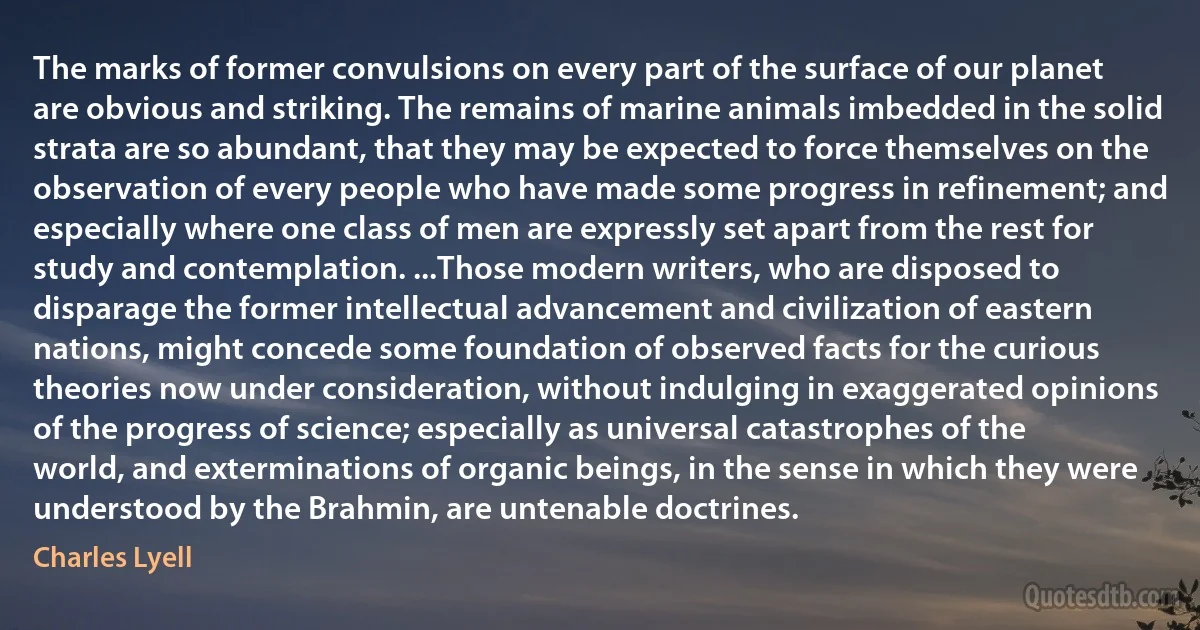
The marks of former convulsions on every part of the surface of our planet are obvious and striking. The remains of marine animals imbedded in the solid strata are so abundant, that they may be expected to force themselves on the observation of every people who have made some progress in refinement; and especially where one class of men are expressly set apart from the rest for study and contemplation. ...Those modern writers, who are disposed to disparage the former intellectual advancement and civilization of eastern nations, might concede some foundation of observed facts for the curious theories now under consideration, without indulging in exaggerated opinions of the progress of science; especially as universal catastrophes of the world, and exterminations of organic beings, in the sense in which they were understood by the Brahmin, are untenable doctrines.
Charles LyellRelated topics
advancement apart brahmin contemplation disparage force indulging intellectual men marine might now organic people refinement rest science sense set strata study surface under universal world remains factsRelated quotes
To conclude, if we call light, those rays which illuminate objects, and radiant heat, those which heat bodies, it may be inquired whether light be essentially different from radiant heat? In answer to which I would suggest that we are not allowed, by the rules of philosophizing, to admit two different causes to explain certain effects, if they may be accounted for by one. ...If this be a true account of the solar heat, for the support of which I appeal to my experiments, it remains only for us to admit that such of the rays of the sun as have the refrangibility of those which are contained in the prismatic spectrum, by the construction of the organs of sight, are admitted under the appearance of light and colors, and that the rest, being stopped in the coats and humors of the eye, act on them, as they are known to do on all the other parts of our body, by occasioning a sensation of heat.

William Herschel
Although there is no study which presents so simple a beginning as that of geometry, there is none in which difficulties grow more rapidly as we proceed, and what may appear at first rather paradoxical, the more acute the student the more serious will the impediments in the way of his progress appear. This necessarily follows in a science which consists of reasoning from the very commencement, for it is evident that every student will feel a claim to have his objections answered, not by authority, but by argument, and that the intelligent student will perceive more readily than another the force of an objection and the obscurity arising from an unexplained difficulty, as the greater is the ordinary light the more will occasional darkness be felt. To remove some of these difficulties is the principal object of this Treatise.

Augustus De Morgan
Shakespeare, no mere child of nature; no automaton of genius; no passive vehicle of inspiration possessed by the spirit, not possessing it; first studied patiently, meditated deeply, understood minutely, till knowledge became habitual and intuitive, wedded itself to his habitual feelings, and at length gave birth to that stupendous power by which he stands alone, with no equal or second in his own class; to that power which seated him on one of the two glorysmitten summits of the poetic mountain, with Milton аs his compeer, not rival. While the former darts himself forth, and passes into all the forms of human character and passion, the one Proteus of the fire and the flood; the other attracts all forms and things to himself, into the unity of his own Ideal. All things and modes of action shape themselves anew in the being of Milton; while Shakspeare becomes all things, yet for ever remaining himself.

Samuel Taylor Coleridge
In France at least, the history of science and thought gives pride of place sciences, sciences of the necessary, all close to philosophy: one can observe in their history the almost uninterrupted emergence of truth and pure reason. The other disciplines, however - those, for example, that concern living beings, languages, or economic facts - are considered too tinged with empirical thought, too exposed to the vagaries of chance or imagery to age old traditions and external events, for it to be supposed that their history could be anything other irregular. At most, they are expected to provide evidence of a state of mind, an intellectual fashion, a mixture of archaism and bold conjecture, of intuition and blindness. But what if empirical knowledge, at a given time and in a given culture, did possess a well defined regularity.

Michel Foucault
The philosophy of nature must not be unduly terrestrial; for it, the earth is merely one of the smaller planets of one of the smaller stars of the Milky Way. It would be ridiculous to warp the philosophy of nature in order to bring out results that are pleasing to the tiny parasites of this insignificant planet. Vitalism as a philosophy, and evolutionism, show, in this respect, a lack of sense of proportion and logical relevance. They regard the facts of life, which are personally interesting to us, as having a cosmic significance, not a significance confined to the earth's surface. Optimism and pessimism, as cosmic philosophies, show the same naive humanism; the great world, so far as we know it from the philosophy of nature, is neither good nor bad, and is not concerned to make us happy or unhappy. All such philosophies spring from self-importance and are best corrected by a little astronomy.

Bertrand Russell
